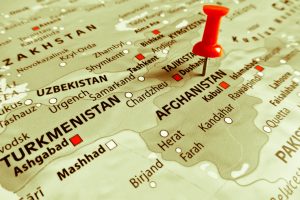
Moscow will keep helping Afghanistan on its own and through the U.N. food agency, Russian officials said Friday as they hosted Taliban representatives for talks on regional threats.
The talks in the Russian city of Kazan came as Moscow is trying to maintain its influence in Central Asia even as it wages war on Ukraine. The discussions focused on regional threats and creating inclusive government, Russian state news agency Tass reported.
Russian President Vladimir Putin’s special representative for Afghanistan, Zamir Kabulov, attended the gathering and said Russia is inclined to keep helping Afghanistan independently and through the World Food Program.
A letter from Russian Foreign Minister Sergey Lavrov was read at the talks, accusing Western countries of “complete failure” in Afghanistan, saying they should “bear the primary burden of rebuilding the country.”
The Taliban seized power in Afghanistan in mid-August 2021 as U.S. and NATO troops were in the final weeks of their pullout from the country after 20 years of war.
Following their takeover, the Taliban gradually imposed harsh edicts, as they did during their previous rule of Afghanistan from 1996 to 2001, based on their interpretation of Islamic law, or Shariah. They barred girls from school beyond the sixth grade and women from almost all jobs and public spaces.
No country has formally recognized the Taliban as the legitimate rulers of Afghanistan. The United Nations says that recognition is “nearly impossible” while the severe Taliban restrictions on women and girls are in place.
Moscow has since 2017 hosted talks with the Taliban and other representatives from other Afghan factions, China, Pakistan, Iran, India, and the former Soviet nations in Central Asia. Taliban representatives were not at the last meeting, in November. No other Afghan factions attended Friday’s talks.
Kabulov, the Kremlin envoy, has previously said that international recognition of the Taliban will hinge on the inclusiveness of their government and their human rights record.
Russia had worked for years to establish contacts with the Taliban, even though it designated the group a terror organization in 2003 and never took it off the list. Any contact with such groups is punishable under Russian law, but the Foreign Ministry has responded to questions about the apparent contradiction by saying its exchanges with the Taliban are essential for helping stabilize Afghanistan.
The Soviet Union fought a 10-year war in Afghanistan that ended with its troops withdrawing in 1989.
Afghanistan’s Taliban-appointed Foreign Minister Amir Khan Muttaqi said Friday that other countries should stop telling them what to do.
“Afghanistan doesn’t prescribe forms of governance to others, so we expect regional countries to engage with the Islamic Emirate rather than give prescriptions for the formation of a government in Afghanistan,” he said in Kazan. The Taliban call their administration the Islamic Emirate of Afghanistan.
Muttaqi invited people to come and see Afghanistan for themselves, and asserted that “tourists, diplomats, aid workers, journalists, and researchers” travel to the country with confidence and roam freely.
No comments:
Post a Comment